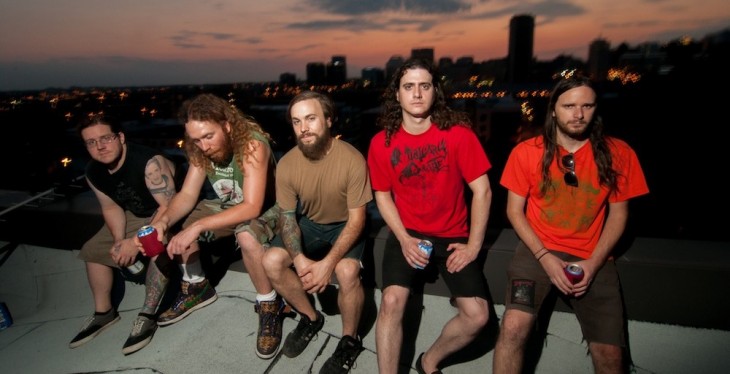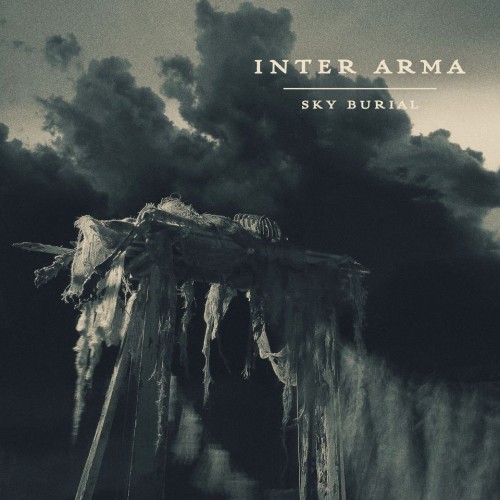Interview: Inter Arma

The boundary lines between styles of metal have been blurring for some time, but heavy music seems to be undergoing a Renaissance of sorts among artists for whom those boundaries don’t even seem to exist. Chief among a current crop of open-ended, open-minded new class of metal futurists is Inter Arma, a Richmond, Va.-based quintet that balances any number of different approaches, be it ominous doom, thick sludge metal, psychedelic rock, folk, noise rock, or even the menacing blast-beat pummel of black metal. It sounds like a lot to take in, but on the band’s new Relapse-released album Sky Burial, they maintain an elegant balance of a wide range of sounds and styles. It’s diverse, yet cohesive, one of the more impressive statements in heavy music in 2013.
After some dynamite appearances at SXSW this year, Treble caught up with the band’s guitarist and co-vocalist, Trey Dalton, to discuss the group’s new album and non-traditional approach.
Treble: Did the process of writing the album begin with an overarching idea, or was it taken more on a song-by-song basis?
Trey Dalton: I would say we did it more piece by piece. There wasn’t necessarily any overall idea that we were trying to accomplish. It was written over a pretty long period of time, and there were lots of different influences going into it. So any cohesiveness is more of a coincidence than anything.
Treble: Each song has so much going on that they’re almost like several songs in one. How do all the parts come together?
TD: It makes more sense to try to knock it out as you go than having eight songs going at the same time. Generally speaking, one of the dudes will bring a riff to the table, and then we’ll work on it until it’s done. Sometimes that takes a couple of weeks, and sometimes it’s a year and a half. The longer it takes, more influences work their way into it. So we just roll with it until it’s done.
Treble: Do you tend to have a fully collaborative songwriting process?
TD: More often than not. Some songs start out written by one person, and then maybe I’ll put my spin on it, or (drummer) TJ (Childers) will put his spin on it. One dude typically doesn’t just write the whole thing and have us play it.
Treble: One of the things that sets Inter Arma apart is how diverse an array of sounds there are in your music. Do you set any limitations?
TD: I don’t know if we’ve set any specific boundaries, but I doubt we’ll put out any electronica or polka. We like the idea of doing whatever we feel like doing. It’s cool to be able to do something without worrying about whether it fits in to what we are.
Treble: Tell me about the sequencing of Sky Burial. It feels very meticulous.
TD: Some of the sequencing had to do with keeping sound fidelity intact for vinyl. The songs are so long that we didn’t want to have 30 minutes on one side and eight on the other. We had a couple of different options for what we thought flowed the best. The way we did it ended up sounding really good, so we felt vindicated.
Treble: Is vinyl presentation important to you?
TD: In a way… We just want it to sound good. So, why not just keep that much in mind? A lot of people buy vinyl, and not as many people are buying CDs anymore. So we just want it to be a whole thing we can give someone. It’s definitely something we kept in mind.

Treble: The title of the album, Sky Burial, as I understand it, comes from a Tibetan practice. And there are other spiritual themes on the album — elements of Native American poetry for instance. What was the inspiration behind exploring some of the spiritual avenues on the album?
TD: Well, off the bat, we’re not spiritual or religious in any sense. But that stuff is pretty interesting anthropologically, and from a scholarly perspective. We’ve had discussions about this as dudes. Mike (Paparo) told me about how he had these ideas, and that he was planning on incorporating some Native American poetry. And I think it fits as an overall theme. There’s not one catalyst, just more that we find that subject matter fascinating.
Treble: Given how long your songs tend to be, does that present a challenge for putting together set lists?
TD: Absolutely. Most of the time we play about 30 minutes, which allows us about three songs. It kinda sucks because you want to play more. But there’s enough going on in our songs that it still works out pretty well. Having ten-plus minute songs is not conducive to just hopping on stage and knocking out a set. We barely can play in 25 minutes. We’d have to go back to some old songs that nobody’s ever heard. I don’t know if challenging is the right word for it… but it presents us with some obstacles.
Treble: When writing, do you keep in mind an idea of how the songs will translate live?
TD: We write to play live. When we were writing these songs, we played them a few times live before we recorded them. And then when we got to the studio there were all these gadgets and toys we could use, like a Theremin. There are parts on the record with lap steel that I try to replicate just with guitar. But we try to remain pretty faithful to the album versions.
But I also think there’s merit to seeing a band and hearing them play songs differently live. It’s a new experience. That’s the way a lot of my favorite bands were when I was younger. It makes it a different kind of thing. Otherwise you might as well just sit at home and listen to the record.
Jeff Terich is the founder and editor of Treble. He's been writing about music for 20 years and has been published at American Songwriter, Bandcamp Daily, Reverb, Spin, Stereogum, uDiscoverMusic, VinylMePlease and some others that he's forgetting right now. He's still not tired of it.

